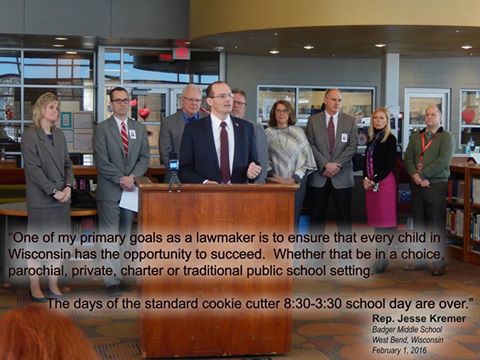
February 1, 2016, West Bend, Wisconsin
We held a press conference at Badger Middle School in West Bend this morning so that Superintendent Ted Neitzke of the West Bend School District and Dr. Mary Pfeiffer of the Neenah Joint School District could present an idea to allow schools more flexibility regarding mandatory time limits in-classroom during the school year.
Neitzke, Pfeiffer and I were joined by other area superintendents who are interested in allowing our classrooms to get out of the “cookie-cutter” model of 8:30-3:30 classroom educating.
State Representative Mike Rohrkaste from the Fox Valley and Senator Duey Stroebel have been instrumental in the working draft of this potential piece of legislation, likely to be introduced after the next election cycle.
I credit the following story is courtesy of Fox6 Milwaukee and Jonathon Gregg
“One of my primary goals as a lawmaker is to ensure every child in Wisconsin has the opportunity to succeed,” Rep. Jesse Kremer (R-Kewaskum) said.
Kremer says public schools are at a disadvantage compared to “Choice” schools.
“The days of traditional cookie cutter style education are over,” Kremer said.
Kremer says even as both public schools and Choice schools receive taxpayer money, Choice schools are free to account for classroom time differently.
“That might be what gives us the competitive edge,” Kremer said.
Flanked by Ted Neitzke, superintendent of the West Bend School District, Kremer on Monday, February 1st said districts should have more discretion when it comes to what counts as “class time.”
“We’re very highly regulated and there are so many rules that are good rules, but there are so many that are antiquated,” Neitzke said.
Ted Neitzke, superintendent of the West Bend School District
Students must spend 180 school days in the classroom, totaling nearly 1,200 hours. But in order for the hours to count, they must be tallied “bell to bell.”
Not so for Choice schools.
“Frankly, we are jealous. We want to have the flexibility of our students to do more innovative things and not have so many constraints that drive when that is,” Neitzke said.
Neitzke insists there are more accurate ways to account for classroom time, which equates to good test scores. He says if districts can prove certain mandates are arbitrary by making the grade without them, then why not.
“How we do that with the rules that are in place is very difficult,” Neitzke said.
“Allow the higher performing schools to take advantage of it and for the lower performing schools, it’s more of a carrot to get them to perform better and then have the option take advantage of these tools,” Kremer said.
Kremer plans to introduce the bill during the next legislative session, because the current one is winding down.
There have been other efforts to change school start times and school day requirements in the past without much success.